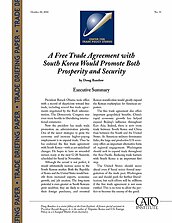Now the president has made trade promotion an administration priority. One of the surest strategies to grow the economy and increase higher-paying employment is to expand trade. Thus he has endorsed the free trade agreement with South Korea — with as yet undefined changes. He hopes to have an amended version ready at the next G‑20 Summit, scheduled for Seoul in November.
Although the accord is not perfect, it would substantially increase access to the South Korean market. Both the Republic of Korea and the United States would benefit from increased exports, economic growth, and job creation. The long-term potential is even greater: as South Koreans grow wealthier, they are likely to increase their foreign purchases, and eventual Korean reunification would greatly expand the Korean marketplace for American exporters.
The free trade agreement also offers important geopolitical benefits. China’s rapid economic growth has helped expand Beijing’s influence throughout East Asia. Indeed, there is now more trade between South Korea and China than between the South and the United States. As American military dominance fades, the large and productive U.S. economy offers an important alternative form of regional engagement. Washington should seek to expand trade throughout the Asia-Pacific. Reducing trade barriers with South Korea is an important first step.
The United States should move ahead even if Seoul resists formal renegotiation of the trade pact. Washington can and should push for further liberalization, but such efforts will be stillborn if the free trade agreement is not soon ratified. This is no time to allow the perfect to become the enemy of the good.


